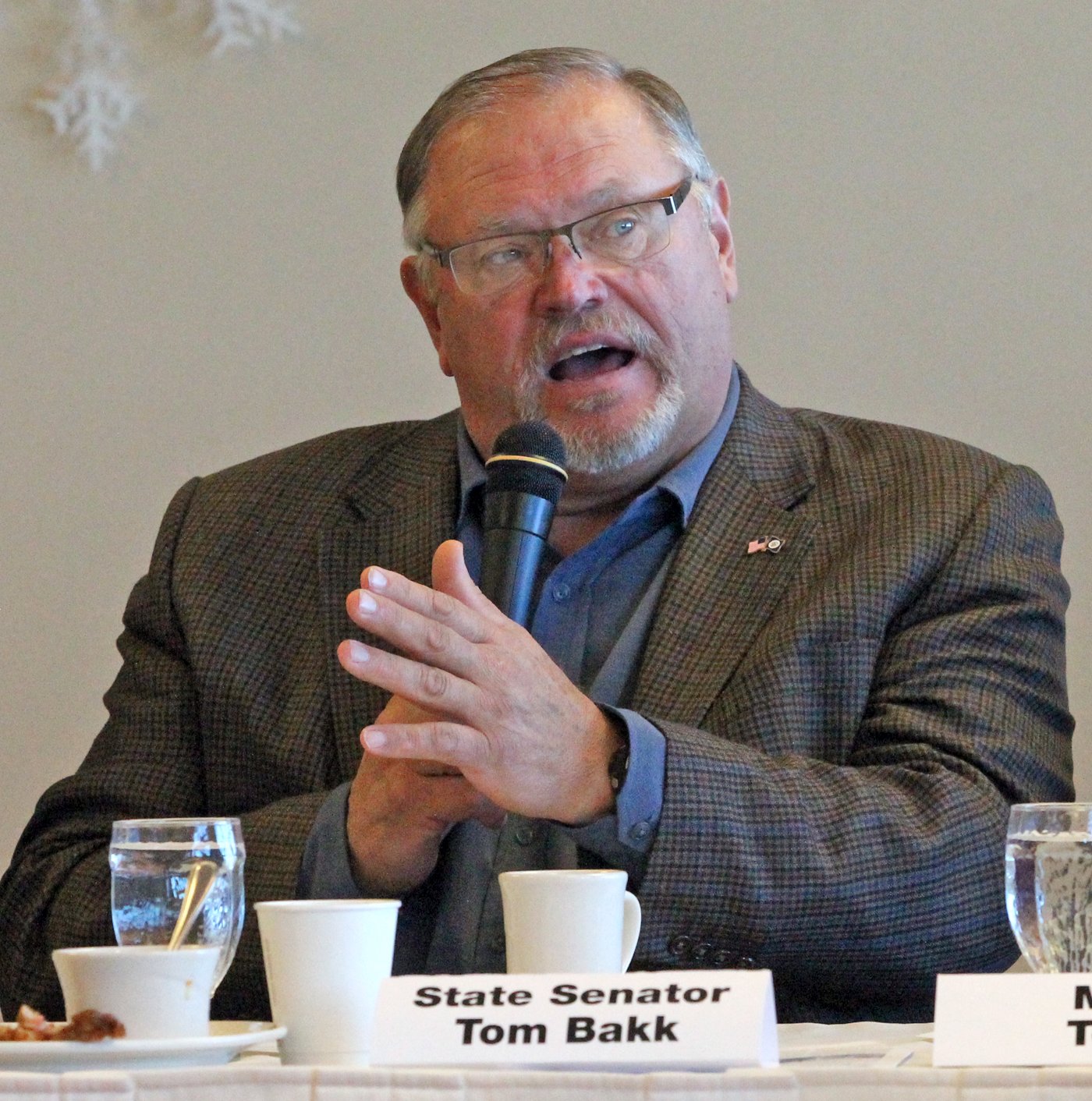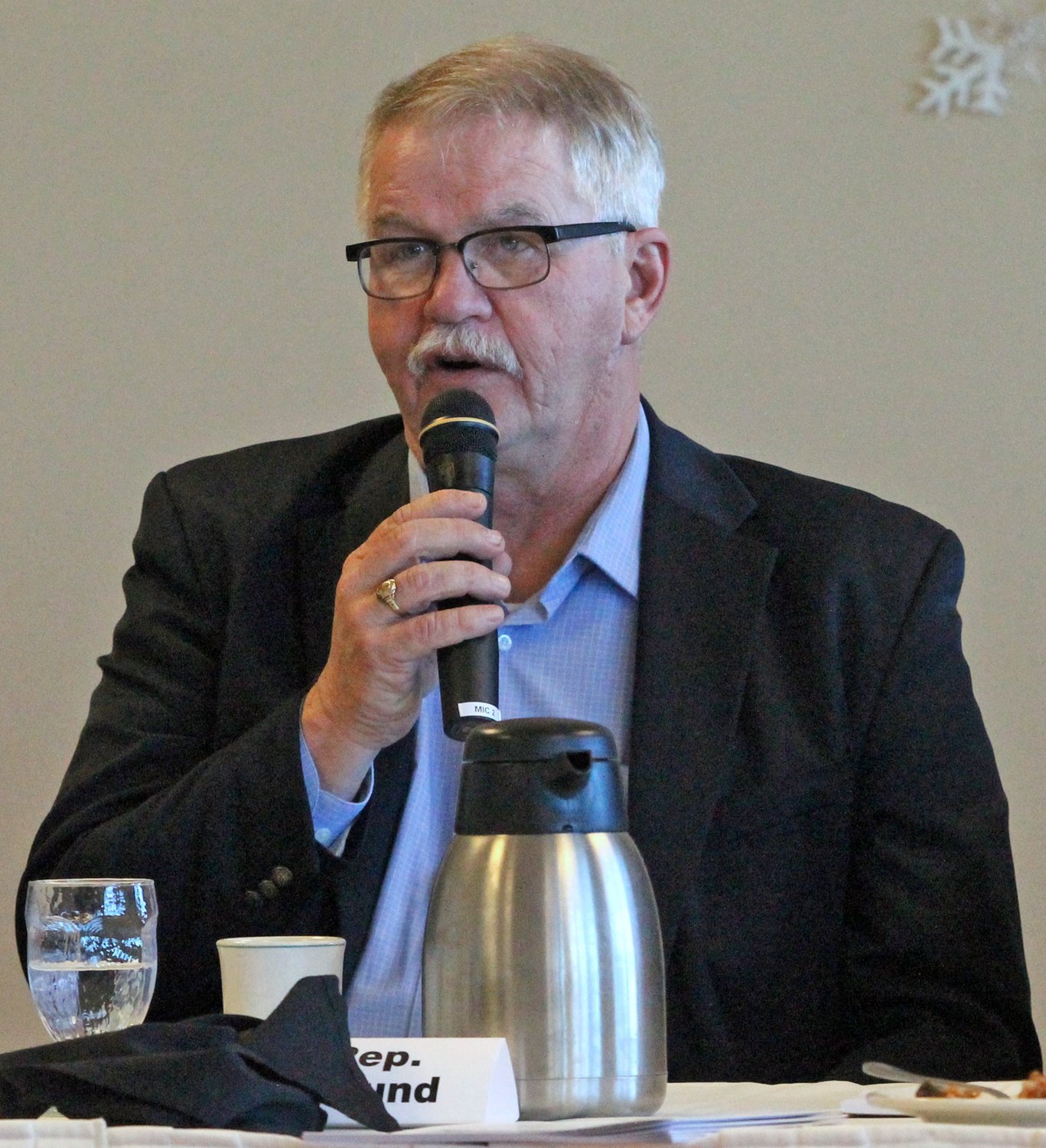Support the Timberjay by making a donation.
Bakk: DNR review can’t stop Twin Metals
Comments part of wide-ranging area Joint Powers meeting
ELY – A wide-ranging discussion at the lightly-attended Community Economic Development Joint Powers Board here last week ultimately turned to the issue of sulfide mining. State Sen. Tom Bakk …
This item is available in full to subscribers.
Attention subscribers
To continue reading, you will need to either log in to your subscriber account, or purchase a new subscription.
If you are a current print subscriber, you can set up a free website account and connect your subscription to it by clicking here.
If you are a digital subscriber with an active, online-only subscription then you already have an account here. Just reset your password if you've not yet logged in to your account on this new site.
Otherwise, click here to view your options for subscribing.
Please log in to continue |
Bakk: DNR review can’t stop Twin Metals
Comments part of wide-ranging area Joint Powers meeting

ELY – A wide-ranging discussion at the lightly-attended Community Economic Development Joint Powers Board here last week ultimately turned to the issue of sulfide mining. State Sen. Tom Bakk responded to fear from local mining advocates, saying that Minnesota’s own environmental impact study of the Twin Metals project by the state’s Department of Natural Resources won’t stop once a mine plan is submitted.
“Once Twin Metals submits a mine plan (perhaps by the end of the year), that the Governor doesn’t somehow get in the way of so the environmental permitting doesn’t start, we can actually have some impact to make sure that PCA and DNR starts the environmental review process when the plan is submitted,” Bakk said during the annual meeting at the Grand Ely Lodge.
“There is a tremendous amount of pressure on the governor to not let Twin Metals get started on the environmental review. The truth is, the environmental review process is not intended to stop projects,” he said. “It’s intended to mitigate impacts, so once they start down that road of applying for those permits it’s pretty hard to stop.”
Bakk continued, “Now it might take a decade or more, but the process isn’t intended to stop projects, so the challenge is going to be making sure the (Gov. Tim) Walz Administration gets his departments working on the permits once we have a mine plan because that’s where we can have some influence.”
Bakk’s remarkably candid comments caught the attention of opponents of Twin Metals. Opponents have been fighting to halt the mine before it ever begins the environmental review and permitting process for the exact reasons that Bakk laid out. “Sen. Bakk’s comments clearly show why the state’s environmental review process should be put on hold until the full federal environmental review of this project is completed and current litigation challenging the Trump Administration’s illegal actions is finished,” said Tom Landwehr, former DNR Commissioner and current Save the Boundary Waters Executive Director, last week.
“The federal review, which killed this project once, is an essential part of the review process and should not be subverted. The Boundary Waters is Minnesota’s crown jewel and it will take leadership from Governor Walz and other state leaders to take action to permanently protect this national treasure,” Landwehr said.
Bakk’s comments were in response to a plea from Conservationists with Common Sense leader Nancy McReady for the (state) Legislature to put forward a resolution opposing continuation of the two-year study of the federal land withdrawal. “Our senators, Smith and Klobuchar, are both pushing for this, and we don’t even have a mine plan,” McReady said.
“There was no additional science after 22 months of study and that’s why the Trump administration stopped it. Having something from the state would be really good because there was no input from the cities, the state, the county, anyone, as far as continuing this two-year study. And this is going to be a job killer if the two-year study has to be continued again,” she said.
State Rep. Rob Ecklund welcomed a resolution, but predicted that it would never get out of the state House. “It would be a waste of time for me to introduce it, it’s as simple as that,” he said. “We are fighting the anti-mining folks, and you know who they are, every day down there. I don’t know what would happen in the state Senate if something like that got introduced or not. In the House it wouldn’t pass. So if it doesn’t pass one body it’s not going to mean anything.”
Bakk continued, “Nancy, I’ve started not even voting on resolutions being sent to Congress. It’s a big joke. When we send one to Washington, D.C., there’s a big circular file it goes into. They have no effect. It helps people to feel good for a while, but Congress doesn’t listen to the 50 Legislatures around the country.”
McReady continued, “Maybe what we need is for the northern delegation of our Legislature to really start speaking out against this two-year study continuation.”
2020 Legislative session
Ecklund said the Legislature’s 2020 session, which begins on Feb. 11, will be mostly a policy and capital investment year. “Both the House and Senate made tours, even up here in Ely, and that’s good to see,” he said.
Ecklund wasn’t too keen on talk about a special legislative session to tackle the insulin-cost issue, because of the split majorities. “We need to do something about this,” he said, “ but the reports I’ve read says there is no kind of agreement out there. Time will tell.”
It’s not a budget-setting session next year, but lawmakers can decide to spend the surplus on anything from new or existing state programs and tax breaks to financing of construction projects. The state typically borrows for public works projects but sometimes pays cash when there is available money.
Ecklund was more optimistic about broadband funding. “Last year I was the chief author on that bill that brought $40 million into the state for broadband investment,” he said. “That’s $20 million each year of the biennium, but we had about $89 million worth of project requests. Those groups that put in requests and didn’t get funding, can resubmit for next year. Don’t get discouraged if you didn’t get chosen. Sharpen up your pencils and see if you can make your proposal better the next time around.”
He noted that there are as many as 12 bonding bills across District 3A. “We’ll work hard to push each community’s interest and see what we can get done.”
Minnesota has a $1.3 billion projected budget surplus, according to the latest economic forecast just released on Dec. 5, setting up a potential conflict between a divided Legislature and Gov. Walz over how to use the extra money.
“Our budget passed last spring was based on forecasted revenue,” Bakk said. “We know what we are going to spend. The Governor will proposes a supplemental budget based on that newest revenue forecast.”
In terms of upcoming bonding bills, Bakk lamented the “totally arbitrary cap” of $1 billion for capital projects. “The legislature has not been able to break through that. We seem to be stuck on that figure.”
He proposed taking all deferred maintenance needs, like water and wastewater infrastructure and other things, “that are not very sexy for the Legislature, and get kicked to the side,” and addressing those needs separately in a $500 million basic core bonding bill. “We can then do a more traditional $1 billion bonding bill and maybe bust through that cap,” he said.
Ballot initiatives will also be considered in the upcoming session. “There are a number of cost-solution amendments out there but I think it is unlikely that any of them will get on the (November) ballot,” Bakk said. “Sometimes amendments get one side or the other really energized with the hope is that it turns out the vote. But legislators have gotten a little bit more skeptical (since two amendment defeats in 2012) about putting things on the ballot.”
One amendment floating out there that Bakk said he would like to see put on the ballot is for judicial selection. “It says that judges are originally appointed by the governor, but instead of automatically going to the ballot for election, they would go to a peer review panel of other judges. Those judges would decide if somebody faces the voters or just get another judge. There is a lot of support for it,” he said.
He predicted campaign literature claiming voters losing their right to vote. “The potential fall out, and what it could do to a campaign is holding the Legislature back from doing something that really seems sensible,” Bakk said.
All 201 legislative seats will be on the ballot next November, and the upcoming election will loom large in whatever action the Legislature takes.
Rental cabins reclassified
Bakk also revealed that letters went out last week from county assessors from recent direction of the State Department of Revenue, to reclassify rental cabins from seasonal/recreational to commercial.
“The taxes on those cabins would probably double and (property owners) are going to be pretty upset,” Bakk said. He said he met with Gov. Walz and Revenue Department officials last month. “This has created a firestorm up on the North Shore, let me tell you.”
He said the state is following the law correctly when cabins are being rented out to create revenue, but he said he is working to soften the tax increase for those cabins that are rented out for just two or four weeks out of the season. “There needs to be some guidance to assessors in how to determine the primary use of the property,” he said.
“This is not as big a deal around here as it is on the North Shore and down around Walker,” Bakk said.
As many as 600 such properties are rented along the North Shore, according to Bakk. He’s looking at the creation of another classification for those cabins that are rented. “Instead of straight-up commercial, is there something in between there?”
He added, “Cabins are very important to Minnesotans, and the carrying cost of them is expensive. People are trying to offset some of those costs to keep them in the family. It is going to be an emotional subject around the Capitol.”







